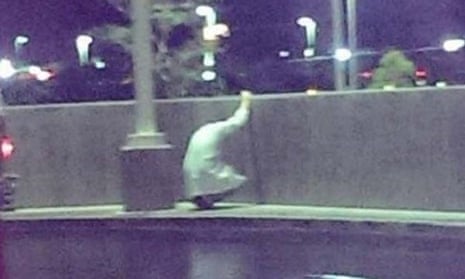It’s a simple and haunting image. An accident and emergency doctor crouches in the California rain, hanging on to a wall, grieving for a lost 19-year-old patient. The snapshot was shared many times on social media, having been posted by a paramedic, with the doctor’s permission. I doubt either of them realised that it would reach – and touch – a huge global audience.
And yet it’s not so surprising that it has. It’s rare to get a glimpse of a doctor whose professional mask has slipped. Judging from the overwhelmingly sympathetic response to this photograph, it’s hard to see why. At first, anyway.
Professional masks are important, because what they hide is important. There’s comfort in being reassured that what they hide is passion, empathy, emotional engagement. We feel sorry for the guy, but also approve of him. We want our caring professions to care.
But we can also see that such empathy might be a professional burden. One hopes, for the doctor’s own sake, that he will not continue to find himself crouching sporadically behind that wall, until one day he decides that medicine is not for him. We can see that he has not yet found a balance – that in order to save lives, he has to be able to accept that lives will sometimes be lost, and that it is for others to weep for those losses.
This is a profound reminder of the huge expectations we have of the medical profession – that they must keenly and authentically understand the pain, fear and loss of others, yet must somehow find a way to protect themselves from the emotions such understanding unleashes. I found myself wondering if a person seriously considering a career in medicine might even be put off by that photograph. The idea that you would have to learn to suppress – but not too much – responses so human, so tender, so natural. Creating that sort of professional distance is a daunting prospect.
To make matters more confusing, a Louisiana lawyer, Marty Stroud, this week spoke out against the dangers of maintaining too great a professional distance. In contrast to the heroic young doctor, Stroud explained, first in a letter to his local paper, the Shreveport Times, then in an interview with them, how much he regretted his part, as lead prosecutor, in convicting Glenn Ford of the murder of Isadore Rozeman, in 1984, which resulted in Ford spending 30 years on death row.
From there, ever since, Ford had been protesting his innocence. New evidence, recently uncovered, cleared his name and Ford is now free after 30 years of incarceration, but is being refused compensation on the technicality that he cannot show himself to be “factually innocent”. He has stage-four lung cancer, and has between four and eight months to live. It is an utterly miserable tale.
Stroud looks utterly miserable, too, as he talks to camera, his eyes cast down about the young man he was when he prosecuted the case: “In 1984, I was 33 years old. I was arrogant, judgmental, narcissistic and full of myself.” Professionally, Stroud did nothing wrong. He made no errors. His apology for his role in the case is an apology for his attitude to the case.
Again, it’s very rare to see a lawyer removing his professional mask. Stroud did his job. Prosecutors prosecute. Stroud’s regret is that a professional distance of which he was proud actually persuaded him that he had no obligation to examine the bigger picture – justice – but just to fulfill his own role in the prosecution process. He has completely changed his view, and now wants to see an end to the death penalty in Louisiana.
For quite different reasons, it’s just as moving to see this professional mask slip as it was the young doctor’s. The doctor was overcome by his empathy. The lawyer saw it as a virtue to have none, and now realises that this was wrong.
Both cases illustrate the limits of professionalism at a time when so much trust is placed in the concept. Calling someone “a consummate professional” is a great compliment, as if the adoption of an appropriate veneer is in itself some guarantee of the quality of what lies beneath.
Good doctors don’t weep for lost patients in public. But that’s not admirable if they have never been capable of weeping for anyone. Good lawyers don’t berate themselves in public when they’ve been involved in a miscarriage of justice. But that’s not admirable when justice isn’t even something they’re concerned with. The individual knows what their professionalism conceals. But that doesn’t mean it’s nobody’s business except theirs.
It’s a good thing that these two men have exposed themselves in these ways. It’s good to have an awareness not just of what professional standards are, but why they are there. Again and again, people are exposed involuntarily for doing things that are unfair or wrong but are considered by them to be fine because they they were “following the rules” or “doing their job” or “acting entirely within professional guidelines”.
What these men show us is that it’s fine occasionally to take off the mask, when all that’s underneath is what should be there – a decent person doing their best, with an understanding of the responsibility of their role and its effect on other people. If you’re hiding something behind your mask though – a flipped mortgage, an evaded tax, a hacked phone – well, that’s a different matter. Professional masks are for protection, not concealment. You’ve no business wearing one if you wouldn’t want the world to see what you look like when it’s off.

